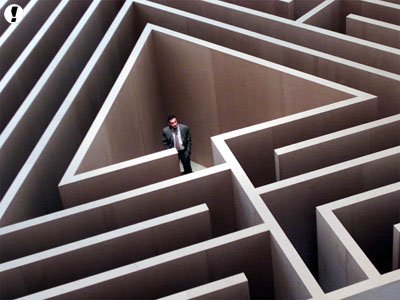|
Why can't I make up my mind? - Have you ever asked yourself that?
We've all encountered that problem when having to make decisions. Sometimes the decisions are minor, even trivial: should I wear the brown shoes or the black shoes? 
Sometimes the decisions are only momentarily important. When we're grocery shopping, for instance, we may stand for a few minutes debating which breakfast cereal to buy.
Sometimes the decisions are important, but not significant. When choosing a car, for instance, a lot of features - an iPod dock, a dark blue interior - may be important, but they're not significant.
Other decisions are much more critical: a choice of occupation, a choice of spouse, how to handle a conflict with a child or parent - or boss.
In all these cases we have to make a decision, and often just can't make up our minds, agonizing over the possibilities, unsure of what's the best route - or the right thing.
And sometimes even after we've made a decision, we revisit it, debating it again, doubting the decision - more, doubting ourselves.
There's a word for this: ambivalence. Psychiatrists describe it as the feeling of being torn between opposing paths.
We often think that, when it comes to decisions, we should be decisive. We should know our minds, be able to total pros and cons like a ledger and choose.
In fact, though, if the choice was so obvious, there would be no choice. All real decisions involve some degree of ambivalence and uncertainty.
We have to recognize that ambivalence is part of the process, that we can't make up our minds until we go through the uncertainty and, yes, discomfort of considering consequences, of realizing that every decision involves risk. We have to see that ambivalence is itself "a tool for exploring alternatives and seeing the larger picture."
A famous story of Reb Levi Yitzchak of Berditchev goes something like this: arguing with G-d that He should be lenient in judging people, he said: "You put the difficulties of observing commandments in this world and the rewards in the next, the pleasures of sin in this world and the punishment in the next. Reverse the placement and You will see how little people sin and how many mitzvot they do."
Experiencing doubt and uncertainty - ambivalence - shouldn't stop us from making a decision. On the contrary, when we feel ambivalent, we know we have a decision to make.
And here the ambivalence itself can tell us which decision to make. For instance, you've started trying to keep kosher. You stopped eating cheeseburgers, or gave up shellfish and non-kosher meat. And now you're debating, is this enough? How will taking the next step affect your life? What will my (fill-in-the-blank: parents, friends, children) say?
Or let's say you're already keeping kosher, but you learn about a higher standard. Should you go there? It's inconvenient, it'll be more expensive, but, it's really the best way to go.
In these cases - and many more (should I make a commitment to that weekly Torah class?) - we have to make a decision. And we have to be honest with ourselves about our ambivalence. Because, whatever we choose, we're going to be uncomfortable, for a while, and we may even have second thoughts.
But that's where a teaching from the Tanya, the primary work of Chabad philosophy comes in: only the tzadik, the completely righteous individual, doesn't have any internal conflict, any ambivalence.
The rest of us, we were born to struggle, to constantly confront ambivalence - should we do the mitzva (commandment) or not? - precisely so we could make the right decision.
And when it comes to matters of Judaism, the Tanya tells us, G-d Himself is there to help us make up our mind.
|
